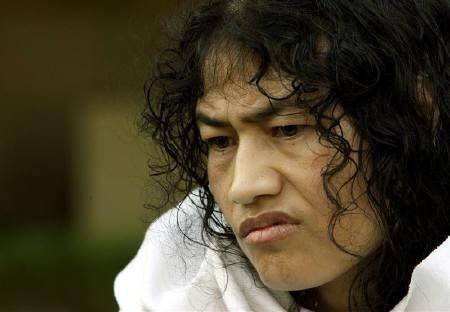‘I Love Life, But I Want Justice’: Indian Activist Irom Sharmila On ‘Suicide Attempt’ Charge Tells Court

An Indian court charged activist Irom Sharmila Chanu Monday with “attempting to commit suicide,” on account of her fast in Delhi in 2006 demanding the repeal of a draconian law in her north-eastern state of Manipur.
Sharmila, 40, who has been fasting for the past 12 years against the controversial anti-insurgent law, Armed Forces Special Powers Act (AFSPA), is currently held in a Manipur jail and has been force-fed through a pipe in her nose since November 2000.
Sharmila was flown into Delhi Sunday, and produced at the Patiala House court Monday morning, the Press Trust of India (PTI) reported.
"I do not want to commit suicide. Mine is only a non-violent protest. It is my demand to live as a human being," the PTI quoted her as telling the judge.
“I love life. I do not want to take my life but I want justice and peace.”
Responding to her statement, the judge said: “I respect you but the law of the land does not permit you to take your life.”
When Sharmila reiterated her demand for the repeal of AFSPA before she ended the fast, the court said: “This is a political process. Here I am concerned with this case only.”
The case relates to her fast until death at Jantar Mantar in New Delhi in October 2006.
AFSPA, which gives sweeping powers to the armed forces and protects soldiers in the event of civilian deaths during militant encounters, has been widely criticized for “fake killings” in Manipur.
Introduced in 1958 to put down separatist movements in certain parts of the country, AFSPA was first enforced in Manipur and later enforced in other insurgency-ridden north-eastern states.
It was extended to most parts of Indian-administered Kashmir soon after the outbreak of armed insurgency in 1989.
Despite continued protests from human rights activists and some of the state governments, India’s defense ministry and the army maintain that the AFSPA is necessary to restore normalcy in regions like Kashmir and Manipur.
Speaking to reporters outside the court room, Sharmila, whose counsel had sought court’s permission to talk to media, asked why the government was “scared of giving her fundamental rights of a human being.”
“I am just a simple woman who wants to follow the non-violent principle of [Mahatma Gandhi], the father of the nation. Just treat us also like him and do not discriminate. As a leadership, don’t be biased against a human being,” she said.
© Copyright IBTimes 2024. All rights reserved.





















